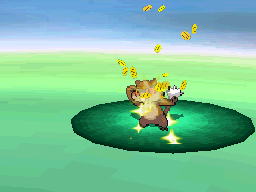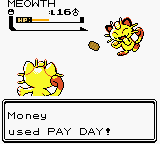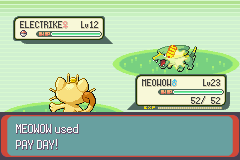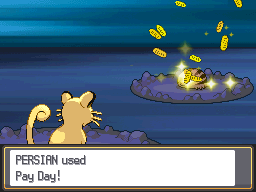Pay Day (move)
| Pay Day ネコにこばん Coin for a Cat | ||||||||||||
| ||||||||||||
Range
| ||||||||||||
Availability
| ||||||||||||
| ||||||||||||
| ||||||||||||
| ||||||||||||
Pay Day (Japanese: ネコにこばん Coin for a Cat) is a damage-dealing Template:Type2 move introduced in Generation I and is Meowth's Signature move.
The Japanese name of Pay Day is a Japanese proverb akin to Pearls Before Swine.
Effect
Generations I-II
Pay Day does damage, and scatters coins on the ground with a value equal to twice the user's level for each time it's used. These coins are picked up afterwards if the player wins the battle.
Generation III
Same as above, except the move scatters coins equal to five times the user's level each time. The Amulet Coin now doubles the number of coins picked up.
Due to a glitch in Pokémon Ruby and Sapphire, the wrong amount of money will be displayed if the Amulet Coin is held, leaving the impression that it does not affect Pay Day. Yet, upon checking the Trainer card, the player will discover that the money earned from Pay Day has been doubled and added to their total savings. This error was fixed in Pokémon FireRed and LeafGreen and all subsequent games.
Generations IV and V
Same as above, except now the Luck Incense also doubles the amount of money picked up.
Learnset
By leveling up
| # | Pokémon | Type | Level | |||||||||||||
|---|---|---|---|---|---|---|---|---|---|---|---|---|---|---|---|---|
| I | II | III | IV | V | VI | |||||||||||
| 052 | 
|
Meowth | Normal | 17 | 20 | 20 | 18 | 30 | 30 | '''' | ||||||
| 053 | 
|
Persian | Normal | 17 | 20 | 20 | 18 | '''' | ||||||||
| Bold indicates a Pokémon gains STAB from this move. Italics indicates a Pokémon whose evolution or alternate form receives STAB from this move. A dash (−) indicates a Pokémon cannot learn the move by the designated method. An empty cell indicates a Pokémon that is unavailable in that game/generation. | ||||||||||||||||
By TM16
| # | Pokémon | Type | Machine | |||||||||||||
|---|---|---|---|---|---|---|---|---|---|---|---|---|---|---|---|---|
| I TM16 |
II -- |
III -- |
IV -- |
V -- |
VI TM08 | |||||||||||
| 025 | 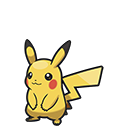
|
Pikachu | Electric | ✔ | ||||||||||||
| 026 | 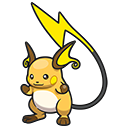
|
Raichu | Electric | ✔ | ||||||||||||
| 031 | 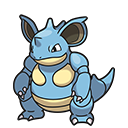
|
Nidoqueen | Poison | Ground | ✔ | |||||||||||
| 034 | 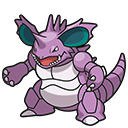
|
Nidoking | Poison | Ground | ✔ | |||||||||||
| 052 | 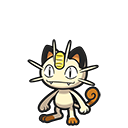
|
Meowth | Normal | ✔ | ||||||||||||
| 053 | 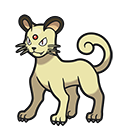
|
Persian | Normal | ✔ | ||||||||||||
| 054 | 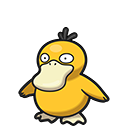
|
Psyduck | Water | ✔ | ||||||||||||
| 055 | 
|
Golduck | Water | ✔ | ||||||||||||
| 056 | 
|
Mankey | Fighting | ✔ | ||||||||||||
| 057 | 
|
Primeape | Fighting | ✔ | ||||||||||||
| 079 | 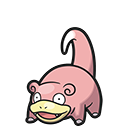
|
Slowpoke | Water | Psychic | ✔ | |||||||||||
| 080 | 
|
Slowbro | Water | Psychic | ✔ | |||||||||||
| 086 | 
|
Seel | Water | ✔ | ||||||||||||
| 087 | 
|
Dewgong | Water | Ice | ✔ | |||||||||||
| 112 | 
|
Rhydon | Rock | Ground | ✔ | |||||||||||
| 143 | 
|
Snorlax | Normal | ✔ | ||||||||||||
| 151 | 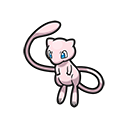
|
Mew | Psychic | ✔ | ||||||||||||
| Bold indicates a Pokémon gains STAB from this move. Italics indicates a Pokémon whose evolution or alternate form receives STAB from this move. A dash (−) indicates a Pokémon cannot learn the move by the designated method. An empty cell indicates a Pokémon that is unavailable in that game/generation. | ||||||||||||||||
By breeding
| # | Pokémon | Type | Father | |||||||||||
|---|---|---|---|---|---|---|---|---|---|---|---|---|---|---|
| II | III | IV | V | VI | ||||||||||
| 187 | 
|
Hoppip | Grass | Flying |  
|
|||||||||
| 509 | 
|
Purrloin | Dark | 
|
||||||||||
| Bold indicates a Pokémon gains STAB from this move. Italics indicates a Pokémon whose evolution or alternate form receives STAB from this move. A dash (−) indicates a Pokémon cannot learn the move by the designated method. An empty cell indicates a Pokémon that is unavailable in that game/generation. | ||||||||||||||
By event
Generation II
| ||||||||||||||||||
Special move
Generation III
| ||||||||||||||||||
Other appearances
When a Meowth appears in a Poké Ball in Super Smash Bros. and Super Smash Bros. Brawl, it uses Pay Day.
In the anime
|
| |||
| Numerous coins are hurled at the foe to inflict damage. | |||
| Pokémon | Method | ||
|---|---|---|---|
| User | First Used In | Notes | |

|
Meowth crosses its arms, then opens them quickly and multiple glowing white balls come out of the charm on its head. | ||
| The Black Arachnid's Meowth | Spinarak Attack | Debut | |
In the manga
Pokémon Adventures
|
| |||
| Numerous coins are hurled at the foe to inflict damage. | |||
| Pokémon | Method | ||
|---|---|---|---|
| User | First Chapter Used In | Notes | |

|
Fearow flaps its wings and multiple gold coins that look like a Meowth's charm comes out of them and fly at the opponent. | ||
| Pokémon Fan Club Chairman's Fearow | The Coming of Slowpoke (Eventually) | Debut Fearow cannot legally learn Pay Day. | |

|
Rapidash points its head towards the opponent and multiple gold coins that look like a Meowth's charm appear and hit the opponent. | ||
| Pokémon Fan Club Chairman's Rapidash | The Coming of Slowpoke (Eventually) | Debut Rapidash cannot legally learn Pay Day. | |

|
Meowth points one of its paws at the opponent and multiple gold coins that look like its charm appear and shoot at the opponent. | ||
| Unknown Trainer's Meowth | The Coming of Slowpoke (Eventually) | None | |
In other generations
Trivia
- In Generation I, Pay Day was one of only three methods (the other two being Elite Four rematches and selling items obtained through a glitch) for players to earn money once all Trainers were defeated. Further generations introduced areas in which rematches could be held, decreasing the usefulness of this move.
In other languages
| |||||||||||||||||||||||||||||||||
| Generation I TMs | |
|---|---|
| 01 • 02 • 03 • 04 • 05 • 06 • 07 • 08 • 09 • 10 • 11 • 12 • 13 • 14 • 15 • 16 • 17 • 18 • 19 • 20 • 21 • 22 • 23 • 24 • 25 26 • 27 • 28 • 29 • 30 • 31 • 32 • 33 • 34 • 35 • 36 • 37 • 38 • 39 • 40 • 41 • 42 • 43 • 44 • 45 • 46 • 47 • 48 • 49 • 50 | |
| Generation I HMs | |
| 01 • 02 • 03 • 04 • 05 | |

|
This article is part of Project Moves and Abilities, a Bulbapedia project that aims to write comprehensive articles on two related aspects of the Pokémon games. |
